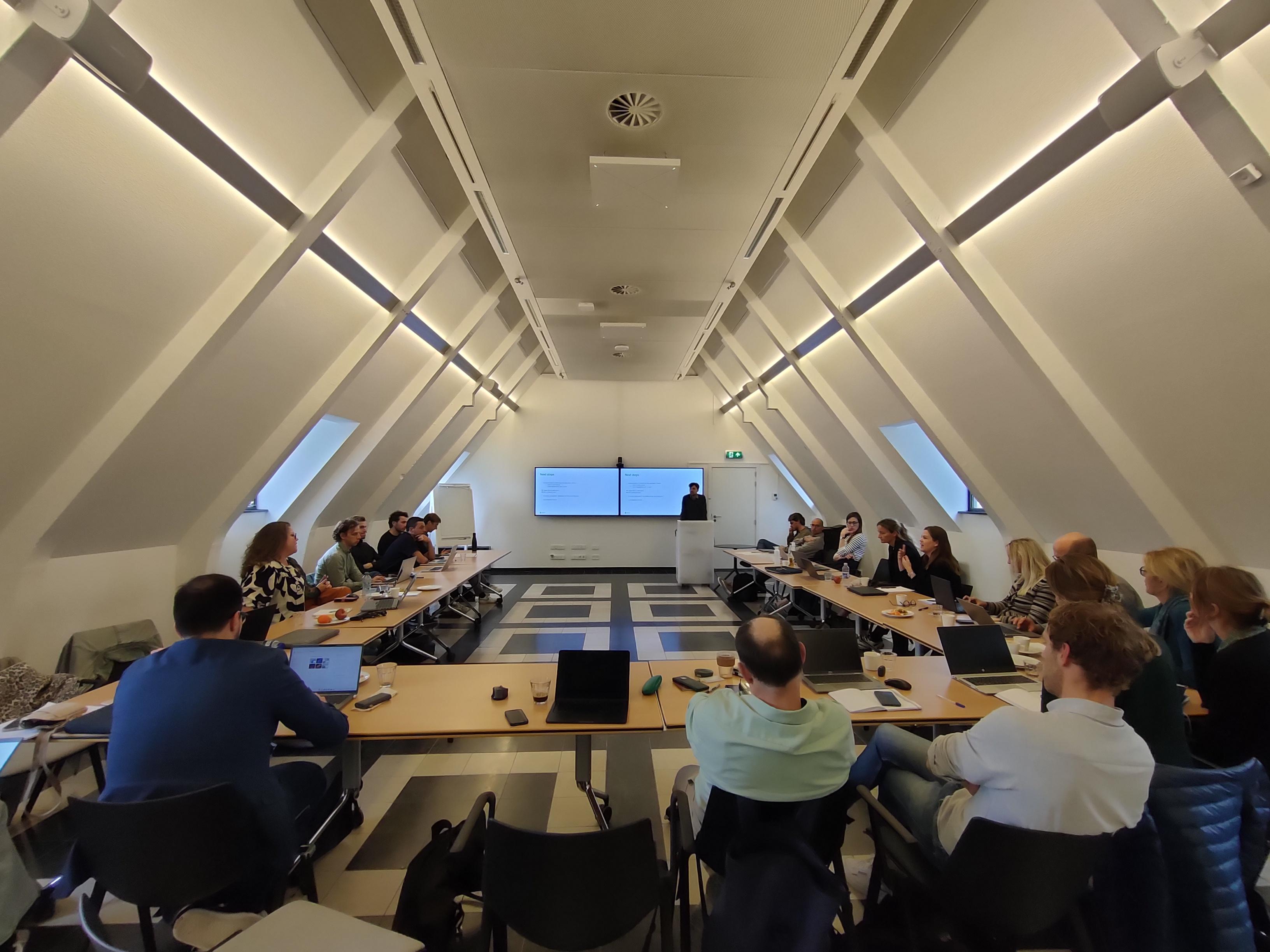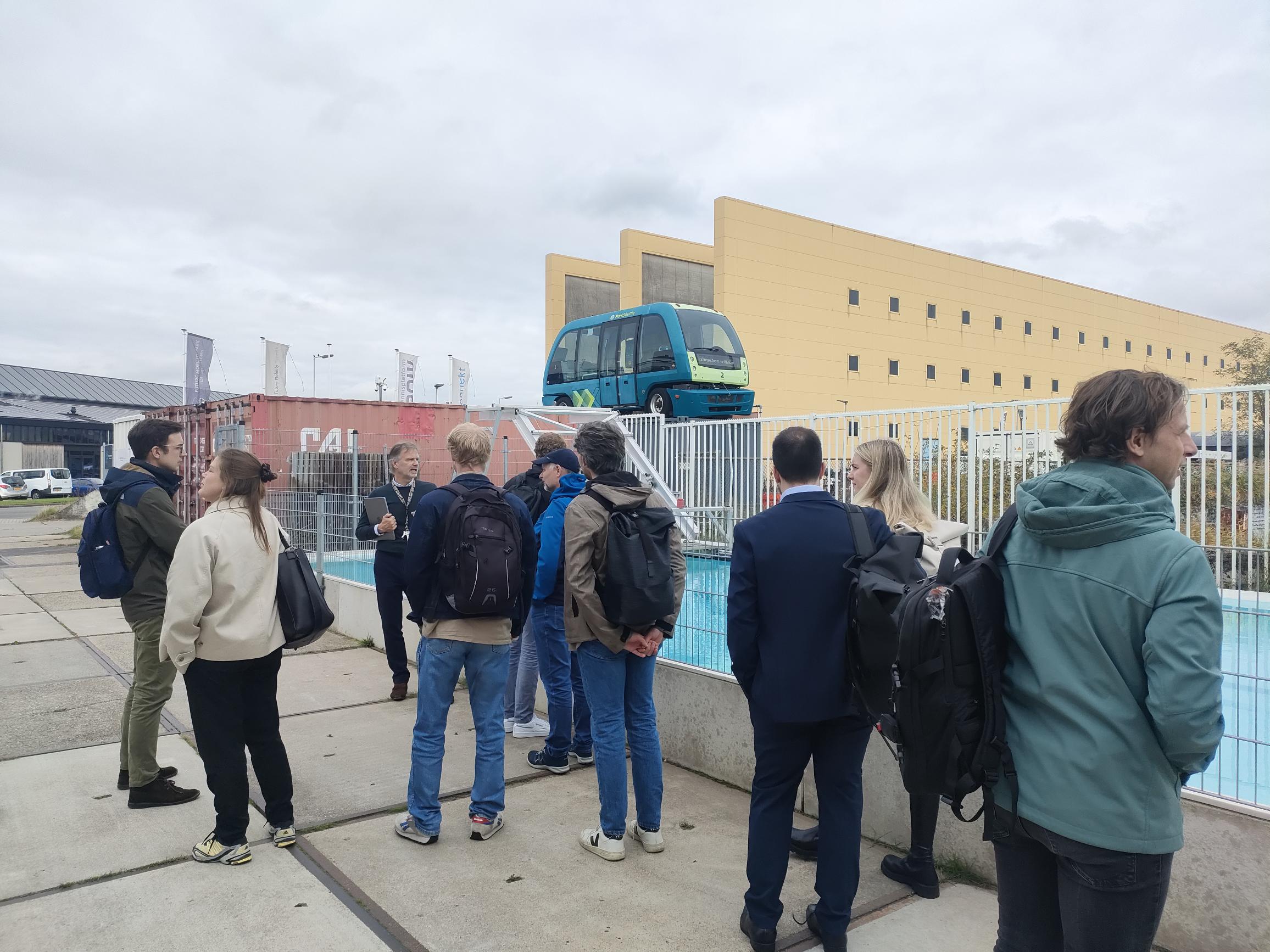Rotterdam hosted the biannual ShareDiMobiHub meeting, highlighting its shared mobility progress through pilot projects and innovative initiatives.
Every six months, ShareDiMobiHub project partners come together for an in-person meeting, fostering collaboration and knowledge exchange. This time, the city of Rotterdam played host, showcasing its latest advancements in shared mobility, including pilot projects and initiatives. The gathering coincided with the Dutch National Meeting on Shared Mobility in Amersfoort, which many ShareDiMobiHub partners also attended, bringing new discussions with national perspectives and insights. Together, these events provided a comprehensive platform to reflect on progress, share experiences, and plan the next steps towards more inclusive and sustainable mobility solutions.
First day – Updates of plans and impact assessment
The meeting began with an update of the partners upscaling plans. Amsterdam is actively expanding its hub network, with three hubs already operational in the Southeast area and three more under construction city’s integration plan focuses on two key areas: the historic centre and De Pijp, where 15 hubs with multi-modal offerings will soon be available, and Zuidflank, set to host 14 hubs. This is also supported by the "Blij dat ik deel!" (Happy to Share!) campaign. Rotterdam and Utrecht Province are developing robust policies for 2024 and 2025, addressing key questions about hub sufficiency and scaling while refining their action plans with extensive internal and external collaboration. Leuven, meanwhile, has laid out a comprehensive action plan prioritising integration with public transport and MaaS, strategic location selection, stakeholder collaboration, and monitoring to ensure effective deployment and increased user adoption.
The University of Antwerp shared the latest findings from their ongoing impact assessment on the adoption of shared mobility hubs. Collaborating closely with the cities of Leuven and Tonsberg, the University has been analysing citizens’ travel behaviour and the strategic placement of hubs to optimise service accessibility and inclusivity. Their research focuses on key factors such as car availability and citizens’ intentions to use shared mobility, gathering insights through targeted surveys to guide effective hub implementation.
The HU University of Applied Sciences Utrecht showcased advancements in their impact analysis tool, designed to provide a quick and user-friendly overview of the potential effects of shared mobility. Acting as both a benchmark and starting point, the tool is grounded in scientific literature and studies on the impacts of shared cars and bikes. A key focus is the Car Replacement Ratio (CRR), influenced by factors such as the type of shared mode, service model, and local policy contexts. The tool enables precise calculations of freed-up space, reduced traffic intensity, and emission reductions, with options to factor in shared fleets featuring younger, smaller, and more electric vehicles.
The afternoon sessions focused on the progress of digitalisation plans, showcasing how cities are integrating data and technology to enhance shared mobility hubs. Utrecht shared updates on their digitalisation plan, having completed a concept draft that underwent a review by project partner Mpact. The next steps involve analysing the feedback, refining the plan, and preparing a summary for broader dissemination. Amsterdam outlined their approach, which begins with a survey conducted in collaboration with the University of Antwerp. A resident letter containing a QR code links to the survey, targeting four hub locations at various project stages: the start, three months in, and upon completion. Additionally, Amsterdam is leveraging the CROW dashboard to collect data mandated by shared mobility permits, enabling them to evaluate hub success through data, surveys, and consultation with mobility providers three months after implementation

Second day - Digital Participatory Platform and inclusion session
The second day began with a briefing on the Digital Participatory Platform (DPP), lead by HAW Hamburg team, and giving partners the opportunity to explore its first draft. The Structured into several chapters, the platform covers key topics such as an introduction to shared mobility, opportunities and challenges, technology concepts, implementation strategies, funding and procurement, and actionable takeaways. Beyond its educational framework, the DPP is an interactive hub where users can build their capacities through tailored learning resources, access a wealth of expert interviews, best practices, and literature, share experiences with shared mobility solutions, and connect with a like-minded community committed to advancing sustainable mobility.
Shared mobility still faces multiple obstacles. Digital and legal barriers, financial barriers, alongside socio-cultural and economic factors like the status symbol of car ownership and reliance on family or community networks. ShareDiMobiHub is focusing on tackling these issues and bringing new tools to bring shared mobility to everyone. The session on inclusion highlighted the challenges and innovative solutions for making shared mobility more accessible to diverse groups.
Autodelen.net presented their approach to overcoming barriers to car sharing in Ghent. Case studies in Ghent, with a new budget allocation for spring 2024, Autodelen.net aims to address these issues by creating a social tariff, conducting outreach in transport-poor neighbourhoods, and engaging elderly users through information sessions and test drives. The initiative seeks to lower entry thresholds by covering fixed costs during the first six months, providing €50 in free credit, and offering personalised support through staff or volunteer buddies. Participants receive ongoing guidance, with measures in place to help transition to regular subscriptions. The project underscores that while barriers to shared mobility are diverse and often overlapping, targeted interventions can empower underrepresented groups, such as the elderly, to embrace these service.
Leuven presented their inclusion pilot. This focuses on understanding the factors and motivations that influence the willingness of individuals with vulnerable socio-demographic characteristics to use shared mobility, as well as the impact on private car use and ownership. The initiative aims to make mobility more accessible for vulnerable residents through tailored solutions. The pilot involves two groups of testers: first-line testers, who register in person at community centres, and second-line testers, community residents who sign up online. Preliminary results from the second testing phase, conducted at Mannenstraat and Sint-Maartensdal, were shared during the session.
Side Visits in Rotterdam: innovation and co-creation
The project also counted with several side visits. During these, participants explored two inspiring locations showcasing the city's approach to shared mobility and innovation.
The first stop was the Future Mobility Park, a testing and demonstration environment where cutting-edge mobility solutions are trialled and refined. This hub provides a space for exploring new technologies and concepts, from autonomous vehicles to shared mobility systems, fostering collaboration among innovators, policymakers, and the local community. The visit offered a look into how Rotterdam is positioning itself in sustainable urban mobility through technological experimentation and public-private partnerships.
Next, the group visited the Pilot Oud-Mathenesse & Witte Dorp, where part of the City of Rotterdam’s efforts are currently focusing on shared mobility. The pilot highlights the importance of developing mobility strategies to specific community needs, with a strong focus on inclusivity and accessibility. Through measures like shared car and bike schemes and infrastructure improvements, the project seeks to reduce car dependency while enhancing local mobility options. Participants gained valuable insights into how Rotterdam balances technological innovation with community-centred approaches to ensure the benefits of shared mobility reach all residents.

Conclusion
The Rotterdam project meeting brought together partners to shared and discuss challenges faced within the project. Partners reflected on pilot advancements, explored digital tools, and examining issues like inclusion and the hindrance of micromobility. From data-driven strategies to empower communities to practical interventions in hub design and outreach, the discussions showcased diverse approaches to making mobility more inclusive and sustainable.
The thematic meeting on hindrance in shared micromobility brought experts and city representatives together to address disruptions like improper parking, congestion, and community complaints. With insights from cities such as Amsterdam and Frankfurt, and contributions from providers like Check, the session demonstrated innovative strategies like geofencing, behavioural campaigns, and targeted hub design to balance user needs, operator sustainability, and urban harmony. You can check the article here
